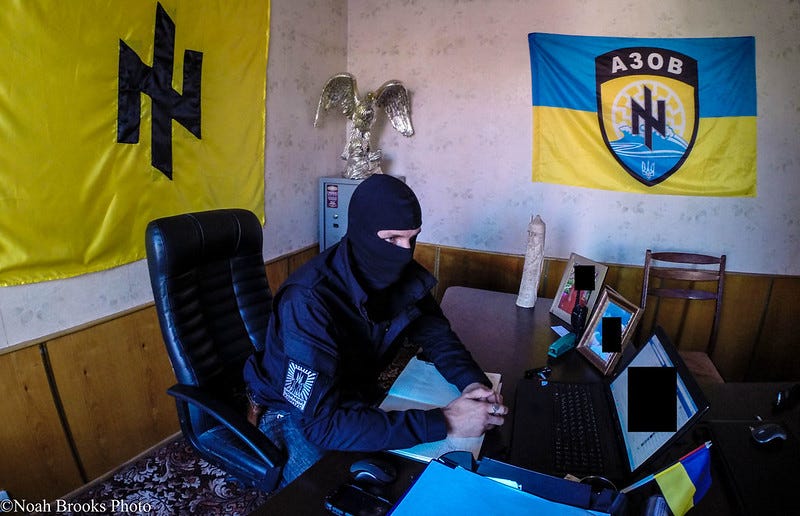Canadian government changes tune on Azov
DND no longer denies arms may have wound up in the hands of Ukrainian far-right extremists
The Department of National Defence won't say for certain that Canada's arms shipments to Ukraine haven't gone towards far-right extremists, including the notorious Azov Regiment.
This contradicts the government's assertion in March that "the Canadian Armed Forces have never - nor will it ever - provide training or support the Azov Battalion or affiliated entities," adding that it would never support the "glorification of Nazism and all forms of racism, racial discrimination, xenophobia, intolerance and extremism.”
The Azov Regiment played a key role in fighting Russian forces during the weeks-long siege of Mariupol, where its forces were confined to the Azovstal steel plant before surrendering to the Russians in May.
With Azov playing an increasingly-prominent role in the fight against Russia's invasion, Canadian media has worked to sanitize the image of an organization it once overwhelmingly referred to as being far-right, according to a joint investigation from The Maple managing editor Alex Cosh and Passage managing editor Davide Mastracci. The Canadian government appears to have changed its tune as well.
"The donations of military aid are being provided exclusively to the Ministry of Defence (MoD) of Ukraine, and these donations are controlled with end users certificates provided by the MoD of Ukraine," a ministry spokesperson said in an Aug. 26 email inquiring whether the Canadian government stands by its prior assertion.
The government's email went on to explain that these certificates "are used to confirm what goods or technology are being exported, to whom, and for what purpose."
All this information was also contained in my March correspondence with the department, but this time it was missing one thing — an explicit denial that Canadian Forces would provide support to Azov, or other like-minded groups.
Asked again if Canada can confirm it doesn't provide support to Azov, the department said it can't provide "[s]pecific details of End-use Certificates with a foreign nation."
"End-use certificates form a line of defence against the diversion of authorized small arms transfers," the spokesperson added.
Meanwhile, Canada is sitting out NATO talks on how to avoid arms shipped to Ukraine winding up on the black market, as David Pugliese at the Ottawa Citizen reported.
"Multiple defence sources tell this newspaper Canada has no idea about the whereabouts of the equipment it has provided to Ukraine as it does not actively monitor the distribution of the gear," Pugliese wrote.
These sources added that "without a tracking system in place and monitoring on the ground, there is no way to verify Ukraine’s claims," even with end-use certificates.
Kelsey Gallagher of disarmament advocacy group Project Ploughshares told me it's "unclear why" Canada won't participate in these discussions with its NATO partners:
Canadian officials should be undertaking post-shipment verification measures to determine the end-use of these weapons. Stopping the diversion of arms is a central aim of Canada’s arms control obligations, and therefore, Canada should be doing everything in its power to ensure its weapons exports are not rerouted to unauthorized end-users or end-uses.
Originally published in The Maple
There’s no worker shortage, but there is a wage shortage
Nearly two-thirds of Canadian job postings are offering wages too low to attract applicants, according to analysis from a progressive economist.
Toronto Star business reporter Rosa Saba reports:
David MacDonald, senior economist for the Canadian Centre for Policy Alternatives, analyzed data from a new temporary labour force survey question that asked workers what the lowest wage was they would accept. He then compared that data to the available jobs posted, and found that 63 per cent of job postings aren’t meeting the minimum worker expectations for wages — in some industries, by a lot.
One reason for this gap is inflation — businesses aren’t offering wages that are keeping up with the cost of living. Another is that while traditionally workers competed for a limited amount of jobs, employers are now competing for a limited number of workers. “The tables are turned,” MacDonald told the Star.
For example, about 14% of open jobs are in the accommodations and food services industry, where the average wage offered is $15.85 an hour, according to Statistics Canada’s Job Vacancy and Wage Survey.
However, according to Statistics Canada’s February and March Labour Force Survey, workers in that industry are looking for at least $18.84 an hour — $3 more than the average employer is willing to pay.
Read the full story here.
In other news …
Duncan’s First Nation in northern Alberta is suing the provincial government, arguing the cumulative impacts of untrammeled industrial development, settlement and agriculture have made it increasingly difficult for band members to exercise their constitutionally-enshrined treaty rights.
Interim Conservative Party of Canada leader Candice Bergen won’t seek re-election after 14 years representing Portage-Lisgar in parliament, although she will continue as MP until the next election.
An Israeli investigation into the killing of Palestinian-American journalist Shireen Abu Akleh has concluded there’s a “high possibility” she was killed by an Israeli soldier, but insists it was accidental and that there’s no basis for a criminal investigation.
The A/V Corner
Listen: I went on The Big Story podcast to talk about the Starbucks unionization wave that’s swept across the United States and into western Canada.
Listen: Trans rights advocate Fae Johnstone joined me and my pals at the Big Shiny Takes Institute to discuss a cowardly transphobic unsigned editorial in Canada’s #1 TERF rag, the National Post.
Watch: A video from Progressive International explains the connection between far-right Brazilian President Jair Bolsonaro’s deforestation of the Amazon and increased violence against Indigenous peoples.




